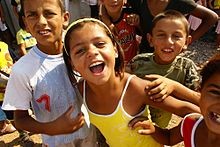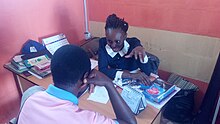Youth mentoring
Adult mentors are usually unrelated to the child or teen and work as volunteers through a community-, school-, or church-based social service program.
[citation needed] According to The Encyclopedia of Informal Education: "The classic definition of mentoring is of an older experienced guide who is acceptable to the young person and who can help ease the transition to adulthood by a mix of support and challenge.
[6] Even studies that demonstrated positive outcomes for youth suggested that benefits from mentoring do not always last for an extended period of time after the intervention has ended.
[10] Further findings indicated that effect size may be increased with the use of specific strategies and practices, such as providing continual support and structure to the mentor and relationship.
Effects were stronger with the delinquent and aggressive outcomes, while still remaining moderate with the group measuring substance use and academic achievement.
"[15] Published literature also indicates that "formal community-based youth mentoring relationships" allow for successful intervention with children in difficult or at-risk environments.
For teachers, mentoring means enhanced skills in supervision and better patience, sense of fulfillment, and increased self-esteem.
[21] The goals of youth mentoring, however, can be simply to turn obstacles into opportunities,[21] and to provide a safe and structured space for children to discover themselves as they develop.
Oftentimes, teachers refer students to participate in a mentoring relationship due to behavioral problems or difficulties with schoolwork.
[22] The mentor meets with the youth in an academic setting and facilitates school work while acting as a supportive role-model.They may also play games, do crafts or partake in non-academic activities.
Paraprofessionals are non-parent adult mentors who are recruited or volunteer to execute certain tasks after being guided and supervised by a professional service provider.
[26] Although the many community-based programs that exist today vary in design and delivery, the majority target skill sets relating to social integration, self-sufficiency, and academic competence.
These factors are “(1) engaging in social activities; (2) engaging in academic activities; (3) number of hours per month spent together; (4) decision-making shared by mentor and mentee; (5) prematch training; (6) postmatch training; (7) mentor screening (only important relationship development in community-based programs); (8) matching; and (9) age of the mentee.
Youth mentoring also addresses the issue of workforce shortages since it utilizes paraprofessionals for child services where the need is high but the resources are limited.
Mentors who prioritize relationship or friendship building tend to be more effective than those who focus largely on goals and reforming their students.
This has found to be a successful approach in The Roma Mentor Project throughout Europe; it is able to build self-confidence, and social skills while also teaching the importance of Romani culture.
[38] Yet another study found that natural male mentors had a significant impact on African American youth in regards to their future economic benefits.
These adults meets with groups of youth for two to three hours, twice a month, to influence their future decisions on education and career development.
[43] Another mentoring program that is starting in rural India implemented by United States researches as well as Indian community members.
[25] According to The Journal of International Social Work, one-on-one mentorships are not as fitting in rural India as they be elsewhere due to a lack of mentors as well as the desire to building peer relationships.
The program is also located in Tampa, Florida, United States and allows for an intercultural exchange of staff members and video between organizations.
The mentor's role in this organization is to help youth set and achieve goals and assist in personal growth of the individual.
[1] There are also programs that are for specific groups of youth such as The National CARES Mentoring Movement, which was created in the aftermath of Hurricane Katrina.
The mentoring typically takes place in the community in a group setting to create positive relations amongst the youth.
[45] In 2002, the Institute of Medicine of the National Academy of Sciences published a major report examining after-school and other community programs designed to foster positive youth development.
[51] Also, the May 31st 2018 "Not Too Young to Run" Bill signed to law by President Muhammadu Buhari encourages youth participation in political leadership roles.
[52] Several community efforts by non-governmental agencies such as the Toni Elumelu Foundation, the Konectin Mentorship Program (KOMP), Strategy for Mentoring Initiative and Leadership Empowerment (S.M.I.L.E) in Lagos as well as We Aspire Youth Mentorship Initiative, a youth based group centered around encouraging males and females alike to engage in peer-based mentoring.
Youth mentoring in Africa [53] has its roots in traditional community practices where elders guided the younger generation.
The need for structured support systems became more apparent, especially in urban areas where young people faced different challenges than in rural settings.
Supported by local and international organizations, these programs aim to address educational, social, and economic challenges by providing guidance and opportunities for young people.




